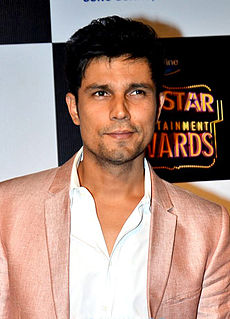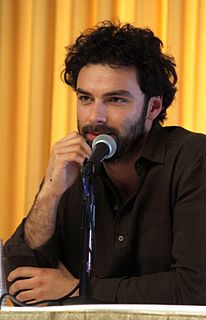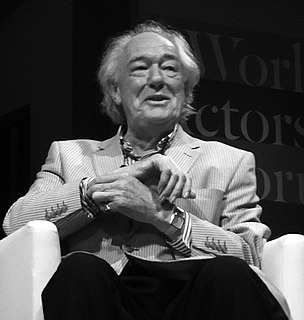A Quote by Randeep Hooda
I find theatre easier than films, because it gives you an environment of a dark hall, the audience concentrating with you... whereas, film sets are not conducive to long rehearsals, and it is difficult to pick up the emotions amidst all that is going on around you.
Related Quotes
At eight o'clock the curtain goes up and that's it, you're out there with yourself, the audience, the other players. There's no "take two" business. You're on. The great thing is the rehearsals, too. When you're bouncing around on film sets and TV sets you don't really get the opportunity to - generally speaking - rehearse much. With theater you're kind of four-to-five weeks locked down in the room with the guys figuring stuff out. It's back to play school.
These types of films that are psychologically sort of dark at times, I find extremely exciting to do because there's always something to think about. There's nothing more boring than to show up on set and say a line and know that your character means exactly what they say. It's interesting to have an unreliable narrator in a film and that's what both of those films have been.
Studing jewelry gives you an incredible technical background. If you can work on very, very small things, then, I think, typically you find it easier to go bigger rather than the other way around. I think a lot of architects have struggled with small things. Whereas if you start small, it's easier to get bigger.
The theatre starts every night at half past seven, and I like the rhythm of going to the theatre, parking the car, going to the stage door; I've grown up with all of that. I'd love to do more theatre - I mean, I shouldn't be telling the world that I can't remember lines any more, but I find it more and more difficult, so I don't know.
I've always loved theatre because it's so immediate. The challenge of it is that, career wise, it's easier to get traction in the industry if you do film and TV because the audience is larger, and because the work can be seen for a longer period of time. I did solid work in a series of regional and Off-Broadway shows, but the work I did on TV or film will have a longer life with a larger audience (and with services like Netflix). Ultimately, there's something intimate about TV, because the storytelling and the actors come home with the viewer. It can be powerful because of that.
Filmmakers need to give the audience that something extra, an incentive to spend money and go to the multiplex - the ticket prices are high. Otherwise they'd just stay home, buy DVDs or download movies. But if there were only big budget movies it would be impossible for the film industry to survive. So I emphasize the importance of mid-range films. But those films need the support of theatre owners. The theatre chains have to have the vision to realize the need to support smaller films for the growth of the domestic film industry.



































